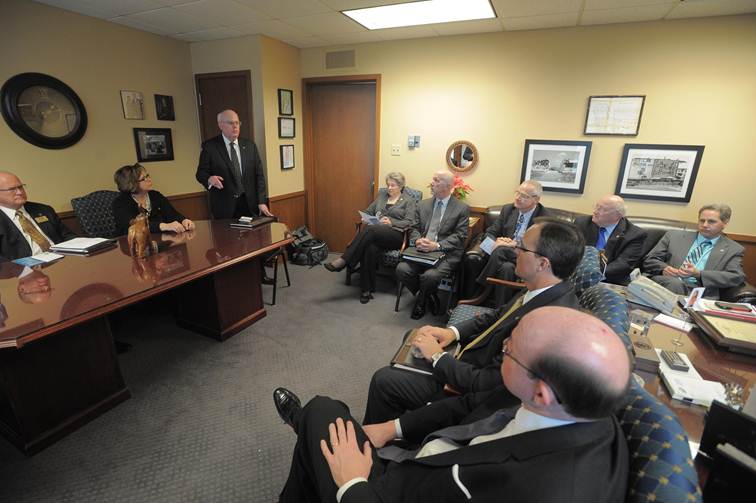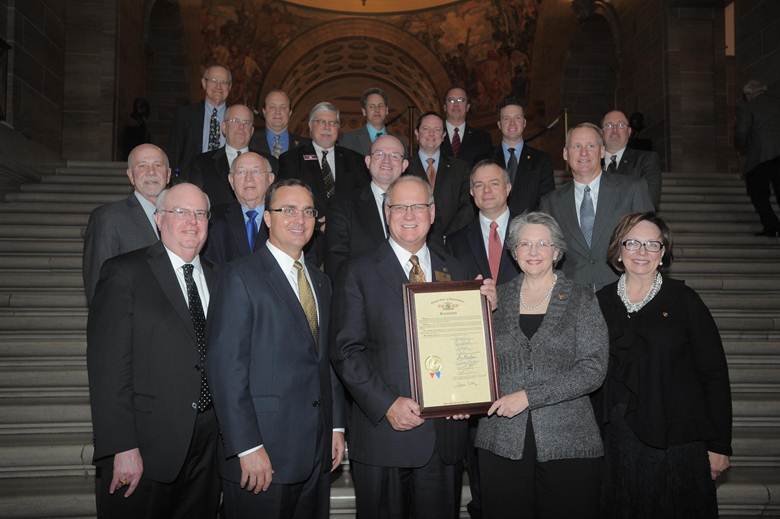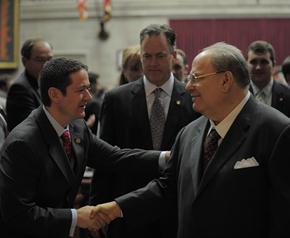VOTER SUPPRESSION EFFORTS CONTINUE
Tuesday at 7:30 am bright and early my House Elections committee heard HB1104, the recycled photo ID bill that has been filed every year since 2006. The sponsor, Rep. Schoeller (R-Springfield), admitted that Missouri “most folks” have a drivers license – which would be required for all voters to provide if this bill becomes law.
I pointed out in questioning him for almost an hour that the Missouri State Constitution applies to ALL folks in our state, not just “most”. The MO Supreme Court ruled in 2006 that voter ID requirements were “unconstitutional”.
Many of the voters, elderly, disabled, working poor and more, who would be disenfranchised under HB1104 have been long time active voters. The 2012 fiscal note of HB1104 estimates over 300,000 current voters could be affected.
Rep. Schoeller also said anyone born prior to 1941 or having a religious objection would be allowed to cast a provisional ballot. I pointed out that via statute, provisional ballots are only available in elections with federal and statewide candidates, eliminating all local, municipal and special elections.
And---most provisional ballots are not counted. In the 2008 general election, nearly 7,000 provisional ballots were cast in Missouri but only 1700 were counted.
I asked Rep. Schoeller when the last time any voter impersonation fraud was documented and prosecuted in Missouri. The answer? 1936.
Yes you read that correctly – 76 years ago during the Pendergast era when gangsters controlled public offices in Kansas City and Jefferson City through voter intimidation and corruption of the ballot box.
Is suspecting hypothetical voter fraud in MO justified in disenfranchising 10,000 Missourians? 100,000 Missourians? Is hypothetical voter fraud justified in telling Joy Lieberman, an 80 year old grandmother, University City school board member for 26 years and a voter since 1952 that she can no longer vote under voter ID proposals? I say most emphatically, no.
HB1104 passed out of committee Tuesday by a partisan vote of 7-3 and goes to the House Rules Committee for approval prior to being placed on the House floor calendar. The Rules Committee is chaired by Rep. John Diehl, the previous voter ID bill sponsor.
I thank those who passionately testified against HB1104 including Ron Berry, MO Secretary of State’s office; Denise Lieberman, senior attorney with the national Advancement Project; Jeremy LaFaver, ACLU of Eastern Missouri; Farilyn Hale of the STL chapter of National Council of Jewish Women and Norma Collins of Missouri AARP. No one testified in favor of voter ID.
Video of the House hearing here:
Media
Voter ID Bill Clears House Committee - KC StarWhy New Photo ID Laws Mean Some Won't Vote - NPR
REPRODUCTIVE RIGHTS RESOLUTION ----PART OF COLLECTIVE ACTION IN 15 STATES
As chair of the Progressive Caucus, this week I filed House Concurrent Resolution #24 to designate the week of January 22-29, 2012 as “Reproductive Rights Awareness Week.” The announcement coincides with the 39th anniversary of the U. S. Supreme Court’s Roe v. Wade decision. HCR24 includes 29 co-sponsors.
From my press release: "The consistent legislative effort to restrict access to legal medical reproductive choices, including birth control, is negatively impacting the health and welfare of women throughout the country,” stated Rep. Newman, chair of the House Progressive Caucus. “This resolution was developed by women to bring education, awareness and action to protect women's health and safety and to ensure reproductive rights under federal law.”
Along with Missouri, the Reproductive Rights Resolution is being introduced in 14 other states including Wisconsin, Florida, Illinois, Kansas, Arizona, Hawaii, South Dakota, North Dakota, Alaska, Michigan, Washington, Utah, New York and Ohio.
State Representative Newman is one of 18 legislators from throughout the U.S. who participated in the July 15-17 2011 Strategic Action Convening on Reproductive Rights and Justice sponsored by the Center for Women's Studies. The group of female lawmakers pledged to introduce a resolution in their 15 states designating a week in January for awareness of reproductive rights. They hope the resolutions will provide a rallying cry to pro-choice advocates nationwide.
MY BILLS SUPPORTED BY MISSOURI COALITION AGAINST DOMESTIC & SEXUAL VIOLENCE
(all filed last week and not yet assigned a committee)
Domestic Violence Weapons Prohibitions House Bill 1437 - to allow law enforcement officers to confiscate weapons at the scene of a domestic violence call and to enact in Missouri law the provisions of federal law that prohibit convicted domestic violence offenders and respondents to full Orders of Protection from possessing firearms and ammunition. I have worked since 2003 to advance this in the MO legislature.
Compassionate Care for Rape Victims House Bill 1439 - would establish new requirements for health care responses to rape victims and access to contraception, would change the laws regarding sex education in schools and require a state women's health care program. Similar legislation has been supported by MCADSV in past sessions but none of the bills ever proceeded beyond the committee level.
Pharmacies required to fill valid prescription for emergency contraception House Bill 1440 - to require pharmacies to fill a valid and lawful prescription for any federal Food and Drug Administration-approved drug or device to prevent pregnancy, including emergency contraceptives, without delay.

WITH ELLIE GLENN, LIASON TO DEPT OF HEALTH AND SENIOR SERVICES
Not a usual occurrence, we discovered in one of our frequent meetings in my office, that we had dressed exactly alike Tuesday. That alone warranted a photo op!
GUN CROSSHAIR STICKERS TARGET SIX STATE LAWMAKERS
The Missouri Capitol Police and State Highway Patrol are investigating a potential threat against six state lawmakers after stickers resembling gun crosshairs were placed on the nameplates outside of the lawmakers’ offices on Jan. 24. After two of the lawmakers removed the stickers, they were later replaced with larger gun sight stickers.
The targeted lawmakers included all four Democratic women in the Senate – Jolie Justus and Kiki Curls of Kansas City, Robin Wright-Jones of St. Louis and Maria Chappelle-Nadal of University City. The others with gun stickers found on their nameplates were House Minority Leader Victor Callahan, D-Kansas City, and state Rep. Scott Dieckhaus, R-Washington. Although the stickers may have been intended as a prank, House and Senate administrators are treating the incident seriously.
LAWSUIT CHALLENGES NEW HOUSE REDISTRICTING PLAN
A bipartisan group of plaintiffs are asking the courts to declare unconstitutional a new plan redrawing the boundaries of the state’s 163 districts in the House of the Representatives. The plaintiffs contend the redistricting plan violates the Missouri Constitution’s requirement that districts be contiguous since six of the new districts cross major rivers yet have no bridge crossings, making it impossible to get directly from one part of the district to the other, except by boat. They also argue the redistricting plan fails to meet constitutional standards that districts be as compact “as may be” and as equal in population “as possible.”
The case was filed as an original action with the Supreme Court on Jan. 23, but the court on Jan. 26 redirected the case to a lower court for a determination of factual issues. The Supreme Court on different grounds recently invalidated the new redistricting plan for the state’s 34 Senate districts. Both the House and Senate redistricting plans were drafted by a panel of six judges of the Missouri Court of Appeals. The Supreme Court also has given a lower court until Feb. 3 to reconsider the validity of Missouri’s eight new congressional districts, which the Republican controlled General Assembly enacted last spring over of gubernatorial veto.
All three new redistricting plans were scheduled to be used for the 2012 election cycle. Time is of the essence in resolving the various redistricting challenges since candidate filing for the Aug. 7 party primaries is set to begin on Feb. 28. It remains uncertain as to what will happen if valid districts for the affected offices aren’t in place by that time.





 Greeting Chief Justice Richard Teitelman on the House Floor following the Justice’s delivery of the State of the Judiciary Address.
Greeting Chief Justice Richard Teitelman on the House Floor following the Justice’s delivery of the State of the Judiciary Address.






